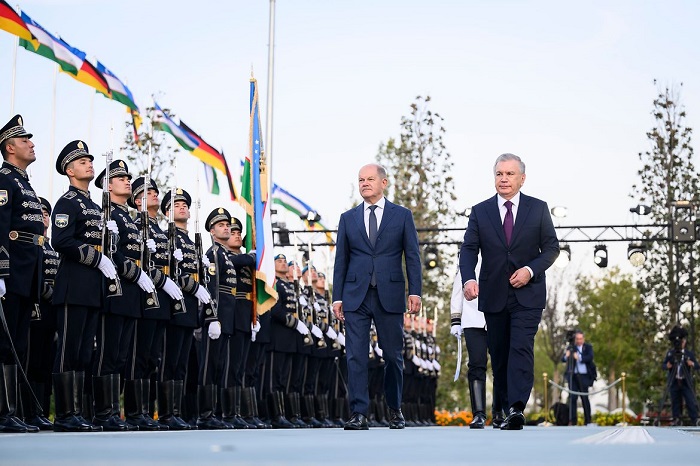On Sunday, 15 September, the Federal Chancellor of Germany Olaf Scholz started his visit to Central Asia. The first stop was Samarkand in Uzbekistan, where he had summit talks with the President Shavkat Mirziyoyev in narrow and expanded formats.
A year ago, a meeting in Germany led to intensified contacts at all levels. Trade turnover between the two countries surpassed 1 billion Euros in 2023.
Cooperation with German businesses has been expanding. Since the beginning of the year, Uzbekistan has received investments from German companies totaling 800 million Euros.
Projects with leading German companies and banks are being developed, with a total value of approximately 9 billion Euros. These projects cover various sectors, including green energy, the chemical industry, critical materials, mechanical engineering, the textile industry, building materials production, and more.
Among the most significant projects noted are the construction of combined-cycle gas power plants with Siemens Energy, methanol Island and the production of “green” ammonia with Linde Group, the development of a large copper deposit with KfW Ipex-Bank, copper mining and cable production with Giga Fiber, the production of carbon fiber with AMK Global, black carbon and hydrogen with Guesscon and many others.
New projects are also being considered for the localization of pumping systems, renewable energy, medical device production, and logistics centers.
Uzbekistan expressed interest in joining the Climate Club, established by the German Government.
In the area of transport and logistics, Mirziyoyev proposed resuming direct flights by Lufthansa to Uzbekistan.
In the field of labor migration, the Uzbek side proposed to develop a “roadmap” for practical cooperation in training and sending in-demand Uzbek specialists to Germany. Interest was expressed in the widespread introduction of the German model of dual education in the regions of Uzbekistan. To develop educational and scientific exchange between leading universities, it is proposed to launch a Forum of universities of the two countries.
In addition, Uzbekistan is ready to open faculties and branches of higher educational institutions in Germany.
Migration Agreement
The German news outlets focused on an intergovernmental agreement on comprehensive partnership in the field of migration and mobility. The agreement aims to facilitate the entry of qualified specialists, especially in healthcare and IT from Uzbekistan to Germany, by simplifying administrative processes. Additionally, it seeks to organize efficient repatriation procedures for Uzbekistan citizens who are not authorized to reside in Germany.
Scholz, at a press conference after the meeting with Mirziyoyev, commented on this agreement: “Of course, we also signed many agreements. I would like to highlight one agreement here, namely the agreement on partnership in the field of mobility in the field of migration. This corresponds to the scheme of agreements that we now want to coordinate in parts with many countries of the world. We enable the necessary immigration of workers with great talents, which we need in Germany so that our economy can grow. At the same time, we agree on simple, non-bureaucratic procedures so that those who need to return will return. This is a completely correct way to accomplish a big task, and in this regard it is a small building block in a very large wall being built – for good work.”
Signed documents
Following the talks, Mirziyoyev and Scholz adopted a Joint Declaration.
8 bilateral documents were also signed, in particular:
– Intergovernmental Agreement on comprehensive partnership in the field of migration and mobility;
– Intergovernmental Declaration on cooperation in the field of veterinary medicine and animal husbandry;
– Intergovernmental Declaration on cooperation in the field of sustainable use of water resources within the framework of the Green Central Asia Initiative;
– Joint Declaration on Cooperation in the Field of Critical Minerals;
– Agreement on cooperation in the field of transport;
– Memorandum on cooperation in the field of climate change within the framework of the Paris Agreement.
In addition, a Program on technological partnership and industrial cooperation for 2024-2026 was adopted.///nCa, 16 September 2024 [photo credit – Bundesregierung/Marvin Ibo Güngör]
